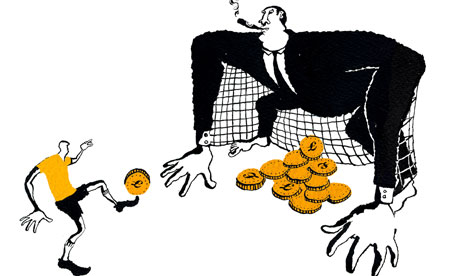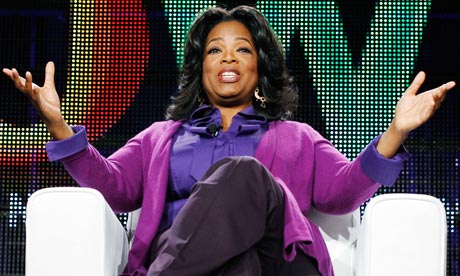An unsustainable system where the rich win and the poor go to the wall. We see it in English football – and beyond

Illustration by Belle Mellor
It's a newspaper convention that the front and back pages are a
world apart, as if news and sport inhabit two different spheres with
little to say to each other. Indeed, it used to be an article of faith
that "sport and politics don't mix", with the former no more than a form
of escapism from the latter. And yet the Occupy Wall Street and London Stock Exchange
protests that led the weekend news bulletins might not be entirely
unrelated to the Premier League results that closed them. For the
current state of our football sheds a rather revealing light on the
current state of both our politics and our economy. Or, as one sage of
the sport puts it: "As ever, the national game reflects the nation's
times."
What that reflection says is that Britain, or England, has become the home of a turbo-capitalism that leaves even the land of the let-it-rip free market – the United States – for dust. If capitalism is often described metaphorically as a race in which the richest always win, football has turned that metaphor into an all too literal reality.
Let's take as our text a series of reports written by the sage just quoted, namely the Guardian's David Conn, who has carved a unique niche investigating the politics and commercialisation of football. Conn elicited a candid admission from the new American owners of Liverpool Football Club, who confessed that part of the lure of buying a stake in what they called the "EPL" – the English Premier League – was that they get to keep all the money they make, rather than having to share it as they would have to under the – their phrase – "very socialistic" rules that operate in US sport. In other words, England has become a magnet for those drawn to behave in a way they couldn't get away with at home.
Start with first principles. Of course, inequality is built into sport: some people are simply stronger or faster than others. What makes sport compelling is watching closely matched individuals or teams compete to come out on top.
But a different kind of inequality matters too: money. A rich club can buy up all the best players and win every time. That's the story of today's Premier League, as super-flush Manchester United sweep all before them, challenged only by local rivals Manchester City – now endowed by an oil billionaire – and Chelsea, funded to the hilt by a Russian oligarch. This, then, becomes a different kind of competition, a battle not of skill, pace and temperament but of pounds, shillings and pence. The clearest manifestation of that came at the close of the transfer window, when the biggest teams splashed out millions to buy the top talent. It means the half-dozen top sides, already at a different level from the rest, soared even higher towards the stratosphere and out of reach – in just the same way that the super-rich float ever further away from everyone else, the 1% in a different league from the 99%, as the Occupy protesters would put it.
Nothing you can do about that, says dogmatic capitalism. You can no more stop the richest teams dominating football than you can prevent the fastest sprinter winning gold. That's the force of the market, all but a law of nature.
Except along comes American sport to show us another way. First, there are those rules on revenue-sharing that so frustrated Liverpool's new owners. All the money that, say, a baseball team makes – from tickets, TV rights and merchandise – is taxed by the major league that runs the sport and spread around the other clubs, so that the richest cannot dwarf the rest. That isn't because the titans of Major League Baseball have read too much Marx. It's because they understand that their sport is worth nothing if it stops being a real competition, if only a handful of the wealthiest teams ever have a chance of winning. Redistributing the wealth around the league ensures their sport doesn't become boring. It does not level the playing field, but it comes very close.
The proof is in the stats so beloved of sporting obsessives. Over the past 19 seasons, 12 different teams have won baseball's biggest prize. In the 19 seasons since the Premier League was created, only four teams have won; Manchester United alone have won the title 12 of those 19 times.
It's not just revenue-sharing that ensures true competition. In American football and basketball a salary cap applies, limiting how much each club can pay in wages and thereby preventing the richest teams making their domination permanent by snapping up all the best players. (A "luxury tax" performs a similar function in baseball.) In the same spirit, teams in all major US sports submit to a "draft", in which they take turns picking from a pool of newly eligible players, so that the equivalent of Chelsea or Manchester City can't gobble up all the fresh talent, but instead have to let the Blackburns or Wigans have a go.
Put like that, it seems fantastical. Who can imagine Old Trafford voluntarily snaffling less of the pie, so that clubs in smaller cities with smaller grounds, and therefore weaker gate receipts, get a look in? And yet English football used to work just like that. When the founders of the Football League gathered in a Manchester hotel in 1888, they fretted over how they might ensure that a fixture between, say, Derby County and Everton remained a real contest. They agreed the home side should give a proportion of its takings to the visitors, a system that held firm till 1983.
Clubs shared the TV money when it came too, spreading it around all 92 league clubs. But the big teams always resented subsidising the minnows; indeed, the Premier League was formed out of the biggest 20 clubs' express desire to keep Rupert Murdoch's millions for themselves. That TV money is at least partly spread throughout the Premier League, but now there are noises about ending even that small nod towards wealth-sharing, so that the biggest half-dozen teams can keep every penny for themselves.
Not for the first time, it's fallen to Europe to act. Upcoming Uefa "financial fair play" rules will require teams to live within their earnings, which should put an end to the sugar daddy handouts of Man City and Chelsea. But that 2014 change will push clubs to maximise their revenue, which is bound, in turn, to mean even less sharing. Football will still be a game determined by who has most money.
There are three consequences of this strange gulf between our rules and those across the Atlantic. First, football's most storied clubs have become attractive to foreign tycoons who sniff a licence to print money, unrestricted. Second, we've established a model that is inherently unsustainable, involving colossal debts that cripple all those without a billionaire to bail them out. Since 1992, league clubs and one Premier League team – Portsmouth – have fallen insolvent 55 times. Third, we risk killing the golden goose, turning an activity that should be thrilling into a non-contest whose outcome is all but preordained.
Hmm, a system that sees our biggest names falling to leveraged takeovers – think Kraft's buy-up of Cadbury – thereby selling off the crown jewels of our collective culture in the name of a rampant capitalism that is both unsustainable and ultimately joyless. That doesn't just sound like the state of the national game, that sounds like the state of the nation.
What that reflection says is that Britain, or England, has become the home of a turbo-capitalism that leaves even the land of the let-it-rip free market – the United States – for dust. If capitalism is often described metaphorically as a race in which the richest always win, football has turned that metaphor into an all too literal reality.
Let's take as our text a series of reports written by the sage just quoted, namely the Guardian's David Conn, who has carved a unique niche investigating the politics and commercialisation of football. Conn elicited a candid admission from the new American owners of Liverpool Football Club, who confessed that part of the lure of buying a stake in what they called the "EPL" – the English Premier League – was that they get to keep all the money they make, rather than having to share it as they would have to under the – their phrase – "very socialistic" rules that operate in US sport. In other words, England has become a magnet for those drawn to behave in a way they couldn't get away with at home.
Start with first principles. Of course, inequality is built into sport: some people are simply stronger or faster than others. What makes sport compelling is watching closely matched individuals or teams compete to come out on top.
But a different kind of inequality matters too: money. A rich club can buy up all the best players and win every time. That's the story of today's Premier League, as super-flush Manchester United sweep all before them, challenged only by local rivals Manchester City – now endowed by an oil billionaire – and Chelsea, funded to the hilt by a Russian oligarch. This, then, becomes a different kind of competition, a battle not of skill, pace and temperament but of pounds, shillings and pence. The clearest manifestation of that came at the close of the transfer window, when the biggest teams splashed out millions to buy the top talent. It means the half-dozen top sides, already at a different level from the rest, soared even higher towards the stratosphere and out of reach – in just the same way that the super-rich float ever further away from everyone else, the 1% in a different league from the 99%, as the Occupy protesters would put it.
Nothing you can do about that, says dogmatic capitalism. You can no more stop the richest teams dominating football than you can prevent the fastest sprinter winning gold. That's the force of the market, all but a law of nature.
Except along comes American sport to show us another way. First, there are those rules on revenue-sharing that so frustrated Liverpool's new owners. All the money that, say, a baseball team makes – from tickets, TV rights and merchandise – is taxed by the major league that runs the sport and spread around the other clubs, so that the richest cannot dwarf the rest. That isn't because the titans of Major League Baseball have read too much Marx. It's because they understand that their sport is worth nothing if it stops being a real competition, if only a handful of the wealthiest teams ever have a chance of winning. Redistributing the wealth around the league ensures their sport doesn't become boring. It does not level the playing field, but it comes very close.
The proof is in the stats so beloved of sporting obsessives. Over the past 19 seasons, 12 different teams have won baseball's biggest prize. In the 19 seasons since the Premier League was created, only four teams have won; Manchester United alone have won the title 12 of those 19 times.
It's not just revenue-sharing that ensures true competition. In American football and basketball a salary cap applies, limiting how much each club can pay in wages and thereby preventing the richest teams making their domination permanent by snapping up all the best players. (A "luxury tax" performs a similar function in baseball.) In the same spirit, teams in all major US sports submit to a "draft", in which they take turns picking from a pool of newly eligible players, so that the equivalent of Chelsea or Manchester City can't gobble up all the fresh talent, but instead have to let the Blackburns or Wigans have a go.
Put like that, it seems fantastical. Who can imagine Old Trafford voluntarily snaffling less of the pie, so that clubs in smaller cities with smaller grounds, and therefore weaker gate receipts, get a look in? And yet English football used to work just like that. When the founders of the Football League gathered in a Manchester hotel in 1888, they fretted over how they might ensure that a fixture between, say, Derby County and Everton remained a real contest. They agreed the home side should give a proportion of its takings to the visitors, a system that held firm till 1983.
Clubs shared the TV money when it came too, spreading it around all 92 league clubs. But the big teams always resented subsidising the minnows; indeed, the Premier League was formed out of the biggest 20 clubs' express desire to keep Rupert Murdoch's millions for themselves. That TV money is at least partly spread throughout the Premier League, but now there are noises about ending even that small nod towards wealth-sharing, so that the biggest half-dozen teams can keep every penny for themselves.
Not for the first time, it's fallen to Europe to act. Upcoming Uefa "financial fair play" rules will require teams to live within their earnings, which should put an end to the sugar daddy handouts of Man City and Chelsea. But that 2014 change will push clubs to maximise their revenue, which is bound, in turn, to mean even less sharing. Football will still be a game determined by who has most money.
There are three consequences of this strange gulf between our rules and those across the Atlantic. First, football's most storied clubs have become attractive to foreign tycoons who sniff a licence to print money, unrestricted. Second, we've established a model that is inherently unsustainable, involving colossal debts that cripple all those without a billionaire to bail them out. Since 1992, league clubs and one Premier League team – Portsmouth – have fallen insolvent 55 times. Third, we risk killing the golden goose, turning an activity that should be thrilling into a non-contest whose outcome is all but preordained.
Hmm, a system that sees our biggest names falling to leveraged takeovers – think Kraft's buy-up of Cadbury – thereby selling off the crown jewels of our collective culture in the name of a rampant capitalism that is both unsustainable and ultimately joyless. That doesn't just sound like the state of the national game, that sounds like the state of the nation.


